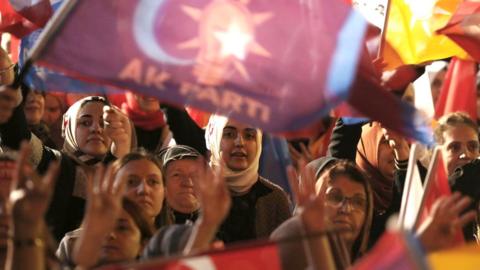A run-off between President Recep Tayyip Erdogan and his main challenger looks increasingly likely, after Turkey’s most closely fought election in decades.
Turkey’s Supreme Election Council says Erdogan is on 49.49% of the vote, with his rival Kemal Kilicdaroglu on 44.79%, with nearly all the votes counted
If neither man secures 50%, there will be a second poll in two weeks’ time.
The incumbent has performed far better than the pre-election polls, which had appeared to suggest Kilicdaroglu’s opposition alliance could triumph.
However Erdogan’s Islamic-rooted alliance has retained its edge
Erdogan has told his AK Party supporters in Ankara that he is ready for a run-off poll if necessary, but believes he can still win outright
Kilicdaroglu has vowed to win the election in a second round, saying his rival failed to get a vote of confidence from the people.
The election comes against the background of soaring inflation and in the aftermath of devastating earthquakes.
It was a very long night – it was tense. This morning it still feels tense, because there is no clear result, and people in general wanted this to end in the first round.
Another two weeks of a tense atmosphere – they didn’t want to take it, especially the opposition supporters.
They are disappointed, because the opinion polls showed that Kilicdaroglu could actually secure the presidency in the first round.
Two recent polls showed he could get more than 50% of the votes, so expectation was high.
They actually felt power was within their grasp, and this was new for them.
About a million Turkish expats have voted in the presidential election, with turnout highest amongst those living in Germany, Canada, and the US, according to the state-run Anadolu Agency.
The Supreme Election Council says the increase in votes overseas is part of what has delayed the vote counting.
The agency says support for Erdogan was high in northern Africa and parts of western Europe, while the Americas and Oceania backed Kilicdaroglu.
The Supreme Election Council says the increase in votes overseas is part of what has delayed the vote counting.
In the run up to the election, Turkey’s President Erdogan still had widespread support but his domestic problems had been piling up and he was up against his strongest contender since he first led Turkey 20 years ago.
Increasing numbers of Turks blame him for inflation, currently at 44%, and for his government’s slow response to the twin earthquakes last February.
He still has the charisma, but his main rival, Kemal Kilicdaroglu, is promising to unify a polarised country.
Erdogan has steadily increased his powers from being prime minister in 2003 to elected president in 2014.
But it was in 2017 that he extended his powers still further, scrapping the role of prime minister and becoming executive president in response to a failed coup.
He runs the country from a vast palace with much of the media controlled by allies, while his rival promises a new start and an end to strongman rule.


